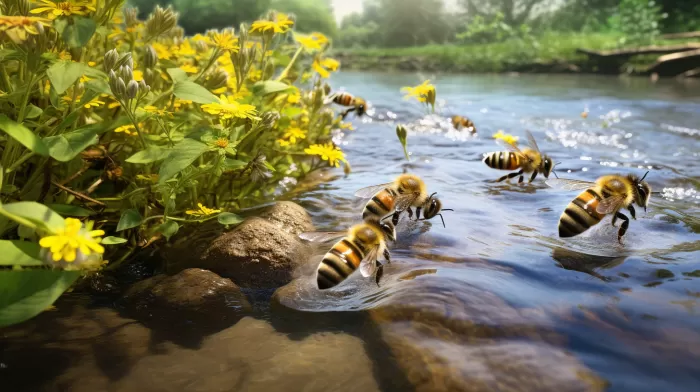A recent study by scientists from the United States Geological Survey (USGS) has revealed the presence of a particular class of toxins in water samples tested in the Midwest. Not only are these toxins, known as neonicotinoids, believed to be responsible for the deaths of honey bees in the area, but they are also thought to pose a risk to human health.
Neonicotinoids are a type of insecticide that has become increasingly popular over the past decade, especially in the agricultural heartland of the Midwest. Farmers in states such as Iowa, Minnesota, Montana, Nebraska, North Dakota, South Dakota, and Wisconsin use huge quantities of these insecticides to protect their crops from a range of insects.
In fact, the use of one specific neonicotinoid known as clothianidin has almost doubled among Iowa farmers since 2011. As these insecticides find their way from farmlands into rivers and streams, they persist in the environment. This means they can and do affect wildlife and cause damage far from where they were initially applied.
When the USGS researchers started analyzing water samples in the Midwest, they found toxins from neonicotinoid insecticides in all nine test streams, including the Missouri and Mississippi Rivers. Of the three types of neonicotinoids tested for in the water, clothianidin was the most commonly found. It appeared in 75% of the test sites and at the highest concentrations, while thiamethoxam turned up in 47% of locations and imidacloprid in 23%.
USGS scientist Kathryn Kuivila, who led the study, has warned that “Neonicotinoid insecticides are receiving increased attention by scientists as we explore the possible links between pesticides, nutrition, infectious disease, and other stress factors in the environment possibly associated with honeybee die-offs.”
To make matters worse, these toxins do not just remain in nature. Due to the phenomenon of biomagnification, neonicotinoids can become more concentrated as they move up the food chain, ultimately finding their way to humans.
What are neonicotinoids doing to honey bees?
The widespread use of neonicotinoid insecticides is believed to be a contributing factor to the mass die-offs of honey bees in recent years. These chemicals are neurotoxic and, when ingested by bees or absorbed through their body surface, they cause a range of neurological problems.
For instance, research has demonstrated that when honey bees are exposed to neonicotinoids, their ability to learn, remember, and navigate can be seriously impaired. Bees unable to navigate are unable to return to their hives, leading to a decline in population numbers. This can have disastrous consequences for agricultural ecosystems, which rely on bees for pollination.
The human health risks of neonicotinoids
While the risk these chemicals pose to honey bees is worrying, you may understandably be more concerned about the potential effects of neonicotinoids on human health. Although large-scale studies on humans are still lacking, some research on animals has indicated that these pesticides could be linked to a range of health problems including various forms of cancer, obesity, hormone disruption, neurological disorders, birth defects, and developmental delays in children.
As these toxins persist in our environment, further research on the potential effects on human health is urgently needed.
How can you protect yourself and your family?
As we wait for the regulatory response to the spread of these toxins, there are several steps you can take to help safeguard the health of your family.
- Use water filters: One effective way to reduce your exposure to toxins in the water is by installing a water filter. Look for one that has been specifically designed to remove or reduce neonicotinoids. This way, you can protect yourself and your loved ones from the potentially harmful effects of these chemicals in your drinking water.
-
Eat organic: Another way to reduce your exposure is by choosing organic produce whenever possible. This helps to minimize your pesticide intake, as organic produce is grown without the use of synthetic chemical pesticides like neonicotinoids.
-
Support local beekeepers: By buying honey from local beekeepers, you not only support their businesses but also encourage their preservation efforts to maintain healthy bee populations in your area.
-
Nurture nature: Take the time to plant a pollinator-friendly garden that incorporates a wide range of native plants. This will provide a healthy habitat and valuable food source for bees and other pollinators.
The spread of neonicotinoid insecticides may seem like a distant problem to many, but it is important to remember that the health of our environment is intrinsically linked to our own personal wellbeing. By taking proactive steps to protect ourselves and the natural world around us, we can preserve our quality of life and the delicate ecosystems upon which we depend.



![8 Simple Rules to Refresh Your Body with a Healthy Cleanse [See Pictures]](https://naturalhealthreserve.com/wp-content/uploads/2024/01/8-rules-healthy-cleanse-slideshow-300x168.webp)